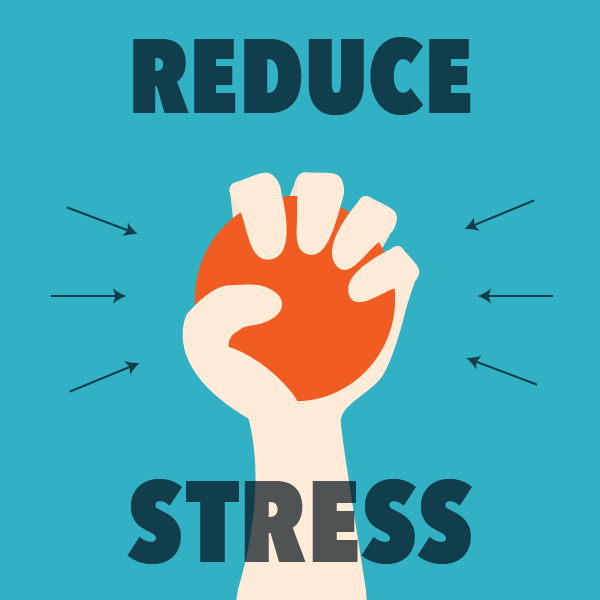Stress Management: Natural tips
Stress is the “psychological, physiological and behavioral response by an individual when they perceive a lack of equilibrium between the demands placed upon them and their ability to meet those demands, which, over a period of time, leads to ill-health” (Palmer, 1989).
:focal(652x167:653x168)/https://public-media.si-cdn.com/filer/ee/bc/eebc7565-839b-4a17-82ab-5f20a1bbf73f/h8cd2ygg-1501513898.jpg)
If you’re living with high levels of stress, you’re putting your entire well-being at risk. Stress wreaks havoc on your emotional equilibrium, as well as your physical health. It narrows your ability to think clearly, function effectively, and enjoy life.

Symptoms of stress
Although we all experience stress differently, some common symptoms include:- Difficulty sleeping
- Weight gain or weight loss
- Stomach pain
- Irritability
- Teeth grinding
- Panic attacks
- Headaches
- Difficulty concentrating
- Sweaty hands or feet
- Heartburn
- Excessive sleeping
- Social isolation
- Fatigue
- Nausea
- Feeling overwhelmed
- Obsessive or compulsive behaviors
Facts about Stress
If you’re not yet convinced about the need to prioritize stress management, the below facts will get you over the line:
- Stress has been referred to as the “silent killer” as it can silently cause heart disease, high blood pressure, chest pain, and an irregular heartbeat (Chilnick, 2008).
- Telogen effluvium is the result of hair loss caused by stress that can happen up to three months after a stressful event (McEwen, 2003).
- Stress is believed to account for 30% of all infertility problems. In women, stress can cause spasms in the fallopian tubes and uterus. In men, it can effect the sperm count and cause erectile dysfunction (Bouchez, 2018).
- Researchers have found that stress worsens acne. More so, than the prevalence of oily based skin (Warner, 2002).
- Stress can be to blame for weight gain too. The stress hormone cortisol has been found to cause both the accumulation of abdominal fat and the enlargement of fat cells, causing what is referred to as “diseased” fat (Chilnick, 2008).
- Correlations have been found between stress and the top six causes of death: cancer, lung ailments, heart disease, liver cirrhosis, accidents, and suicide (“How Does Stress Affect Us?”, 2016).
- In children, chronic stress has been found to negatively impact their developmental growth due to a reduction of the growth hormone in the pituitary gland (Van der Kolk, B. et. al., 2007).
- The word itself, “stress” stems from the Latin word stringere, meaning “to draw tight” (McEwen, 2003).
- In the event of chronic stress, dominant hormones are released into our brain. These hormones are intended for short-term emergencies and in the event where they exist for extended periods they can shrink, impair and kill brain cells (Wallenstein, 2003).
- Stress can increase the likelihood of developing blood clots since the blood prepares itself for injuries and becomes “stickier” (Chilnick, 2008).
- Chronic stress can place pressure on, and cause damage to arteries and organs. This occurs due to an inflation in our bodies caused by cytokines (a result of stress) (McEwen, 2003).
- Stress is also responsible for altering our blood sugar levels, which can lead to fatigue, hyperglycemia, mood swings, and metabolic syndrome (“How Does Stress Affect Us?”, 2016).
- On a positive note, we can reduce our stress levels by laughing. Having a chuckle, lowers the stress hormones, including cortisol, epinephrine, and adrenaline, and strengthens our immune system by releasing positive hormones (Wallenstein, 2003).
- More good news, especially for chocolate lovers, dark chocolate has also been found to reduce our stress hormones (Wallenstein, 2003).

Unhealthy ways of coping with stress
These coping strategies may temporarily reduce stress, but they cause more damage in the long run:• Smoking
• Drinking too much
• Overeating or undereating
• Zoning out for hours in front of the TV or computer
• Withdrawing from friends, family, and activities
• Using pills or drugs to relax
• Sleeping too much
• Procrastinating
• Filling up every minute of the day to avoid facing problems
• Taking out your stress on others (lashing out, angry outbursts, physical violence)

Stress Management Tips
People can learn to manage stress and lead happier, healthier lives. Here are some tips to help you keep stress at bay.- Keep a positive attitude.
- Accept that there are events that you cannot control.
- Be assertive instead of aggressive. Assert your feelings, opinions, or beliefs instead of becoming angry, defensive, or passive.
- Learn and practice relaxation techniques; try meditation, yoga, or tai-chi for stress management.
- Exercise regularly. Your body can fight stress better when it is fit.
- Eat healthy, well-balanced meals.
- Learn to manage your time more effectively.
- Set limits appropriately and learn to say no to requests that would create excessive stress in your life.
- Make time for hobbies, interests, and relaxation.
- Get enough rest and sleep. Your body needs time to recover from stressful events.
- Don't rely on alcohol, drugs, or compulsive behaviors to reduce stress.
- Seek out social support. Spend enough time with those you enjoy.
- Seek treatment with a psychologist or other mental health professional trained in stress management or biofeedback techniques to learn healthy ways of dealing with the stress in your life.


No comments